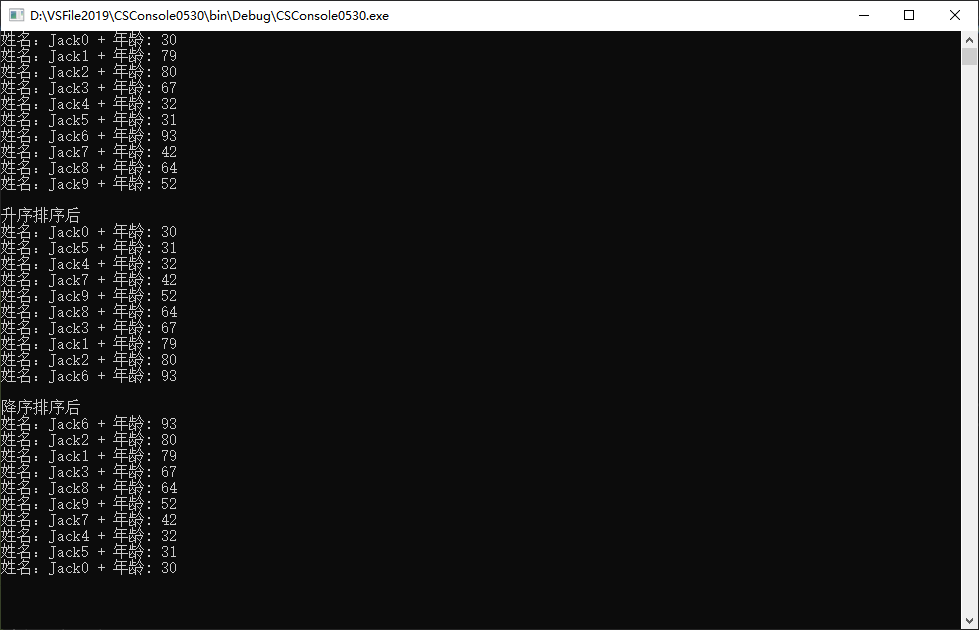C#比较器Comparer/Sort排序的类内实现和类外实现
比较规则
CompareTo(Object)
将此实例与指定对象进行比较并返回一个对二者的相对值的指示。
public int CompareTo (object? value);
参数value Object要比较的对象,或为 null。
返回Int32一个带符号数字,指示此实例和 value 的相对值。
|
返回值 |
说明 |
|
小于零 |
此实例小于 value。 |
|
零 |
此实例等于 value。 |
|
大于零 |
此实例大于 value,或 value 为 null。 |
类内实现比较器
//Person类,自带比较器 public class Person : IEquatable<Person>, IComparable<Person> { public int age; public string name; public Person(int age) { this.age = age; } public Person(string name, int age) : this(age) { this.name = name; } public override string ToString() { return $"姓名:{this.name} + 年龄: {this.age}"; } //实现可比较接口 public int CompareTo(Person other) { if (other == null) return 1; return this.age.CompareTo(other.age); } //实现可相等接口 public bool Equals(Person other) { if (other == null) return false; return this.age.Equals(other.age); } //运算符重载 public static bool operator >(Person person, Person other) { if (other == null) return true; return person.age > other.age; } public static bool operator >=(Person person, Person other) { if (other == null) return true; return person.age >= other.age; } public static bool operator <(Person person, Person other) { if (other == null) return false; return person.age < other.age; } public static bool operator <=(Person person, Person other) { if (other == null) return false; return person.age <= other.age; } }
测试
static void test1() { List<Person> list = new List<Person>(); Random r = new Random(); for (int i = 0; i < 10; i++) { list.Add(new Person($"Tom{i}", r.Next(1, 100))); } foreach (var item in list) { Console.WriteLine(item.ToString()); } //Person自带比较器 list.Sort(); Console.WriteLine("排序后"); foreach (var item in list) { Console.WriteLine(item.ToString()); } }
运行结果

类外实现
//学生类,无比较器,需要在外部专门声明一个比较器 public class Student { public int age; public string name; public Student(int age) { this.age = age; } public Student(string name, int age) : this(age) { this.name = name; } public override string ToString() { return $"姓名:{this.name} + 年龄: {this.age}"; } } //学生比较器,实现可比较接口(默认) public class StudentComparerAscend : IComparer<Student> { public int Compare(Student x, Student y) { int result; if(x==null&&y==null ) result= 0; if (x == null && y != null) result = -1; if (x != null && y == null) result = 1; result= x.age.CompareTo(y.age); return result; } } //学生比较器,实现可比较接口(反序) public class StudentComparerDescend : IComparer<Student> { public int Compare(Student x, Student y) { int result; if (x == null && y == null) result = 0; if (x == null && y != null) result = -1; if (x != null && y == null) result = 1; result = x.age.CompareTo(y.age); return -result;//实现反序 } }
测试
static void test2() { List<Student> list = new List<Student>(); Random r = new Random(); for (int i = 0; i < 10; i++) { list.Add(new Student($"Jack{i}", r.Next(1, 100))); } foreach (var item in list) { Console.WriteLine(item.ToString()); } //实例化升序比较器 StudentComparerAscend comparerAscend = new StudentComparerAscend(); //升序排序(默认) list.Sort(comparerAscend); Console.WriteLine("\n升序排序后"); foreach (var item in list) { Console.WriteLine(item.ToString()); } //实例化降序比较器 StudentComparerDescend comparerDescend = new StudentComparerDescend(); //降序排序 list.Sort(comparerDescend); Console.WriteLine("\n降序排序后"); foreach (var item in list) { Console.WriteLine(item.ToString()); } }
运行结果





【推荐】国内首个AI IDE,深度理解中文开发场景,立即下载体验Trae
【推荐】编程新体验,更懂你的AI,立即体验豆包MarsCode编程助手
【推荐】抖音旗下AI助手豆包,你的智能百科全书,全免费不限次数
【推荐】轻量又高性能的 SSH 工具 IShell:AI 加持,快人一步
· 震惊!C++程序真的从main开始吗?99%的程序员都答错了
· 【硬核科普】Trae如何「偷看」你的代码?零基础破解AI编程运行原理
· 单元测试从入门到精通
· 上周热点回顾(3.3-3.9)
· Vue3状态管理终极指南:Pinia保姆级教程